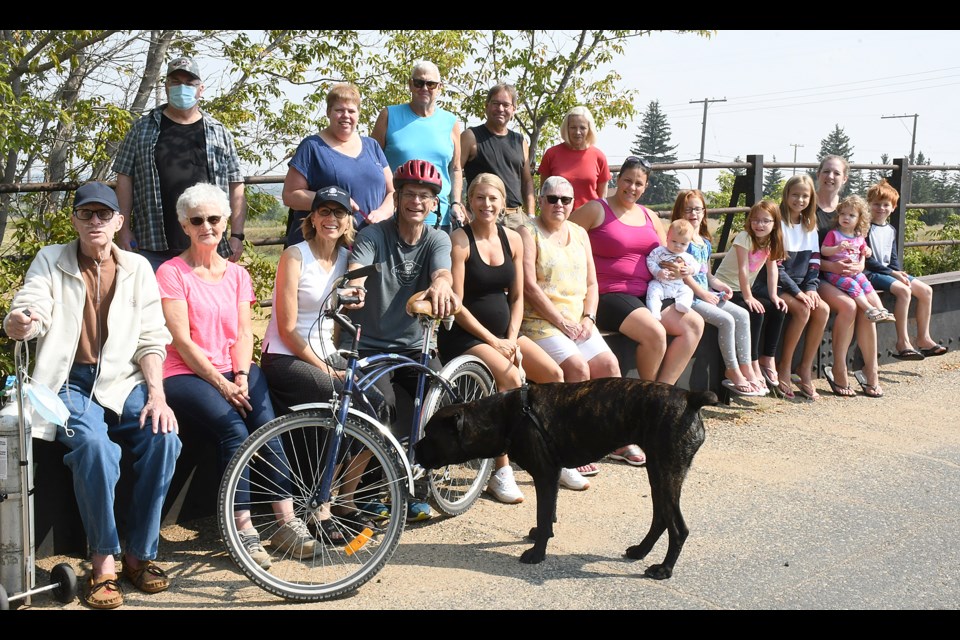It could cost almost $200,000 to demolish the 108-year-old Coteau Street East bridge, but some citizens say a less expensive solution would keep the South Hill bridge operational.
Randy Zaiser is concerned about the bridge’s demolition, saying many people use the structure daily to access Wakamow Valley. If the bridge did not exist, residents would have to trot an extra kilometre to reach the valley.
“There’s nothing wrong with it for a walking bridge,” he said. “I understand that it’s deteriorating as far as a vehicle bridge goes; fine, close it. But for people walking on it, it will last another hundred years. Why dismantle it?”
Zaiser said Coun. Crystal Froese spoke to him recently about the bridge and told him that some people don’t understand this issue since they don’t live on South Hill. He didn’t understand why city council agreed to tear down the bridge without first having public consultations.
Instead of demolishing the bridge, Zaiser thought a cheaper option for city hall would be to install concrete barriers. This would prevent vehicles from using the structure — they could use Home Street — and save taxpayers money.
Surveying residents
Doug Reichel, another area resident, is also concerned about the removal of the bridge. Removing the structure would leave “two very crude access points” into the park, specifically River Drive and Home Street, with the latter being “an absolute disaster” that needs upgrading.
Reichel recalled receiving a survey from city hall about 10 years ago that asked residents what they wanted with the bridge. Many people said they wanted it turned into a walking path, which city hall apparently said could happen.
“There’s a piece of paper somewhere that tells them that that’s what they’re going to do in the next couple of years … ,” he remarked. “But somewhere in all of this state, the city has lost their own instructions and their own plan.”
City responds
In an email to the Express, city hall explained that it sent out letters to 40 residents in 2009 and received seven responses. Six were from adjacent residences and one was from the Bible college. All six responses supported closing the bridge to traffic, while the Bible college asked for the bridge to remain open to vehicles.
In 2017, the municipality asked Stantec Engineering to assess all city bridges, the email added. The Coteau Street bridge received the lowest rating, behind only the Seventh Avenue Southwest bridge and Fourth Avenue (Thunderbird Viaduct) bridge.
A historic bridge
“That’s a classic, historic (bridge),” said Reichel. “I mean, if the city had its act together or invited comments from people, you could actually have a bridge tour of the city, you know?”
Reichel also spoke with Froese, who told him council voted down a motion during the 2019 budget discussions to preserve the bridge.
This issue is a good reason why Moose Jaw needs a ward system, so councillors better understand the issues in each area, he said. He also thought city hall needed to take ownership of these problems since they harmed community growth.
“The loss of that bridge would be huge,” he added.
The Moose Jaw Express was unable to reach Coun. Froese for comment about this issue by deadline.
Costs to maintain and destroy
The City of Moose Jaw erected the bridge over the Canadian National Railway (CNR) line in 1913. Several analyses of the bridge have been conducted over the years, including in 2005, 2012, 2017, 2018 and 2020.
Associated Engineering (AE) assessed the structure last year and found the bridge to be in poor condition. To demolish it would cost $150,000, including work, general conditions and co-ordination with CN Rail.
Based on these findings, city administration recommended to city council that the structure be demolished — council agreed — since it would not be structurally sound by 2025, city hall said in an email. Options to convert the structure to a pedestrian bridge “would carry a significant capital cost” and still require a new bridge built within five to 10 years.
AE’s report indicated that, on the high side, it would cost $1.8 million for minor maintenance and replacement in 2025, $1.1 million for conversion to a pedestrian bridge and replacement in 2025, $2.7 million for major rehabilitation and replacement in 2035, and $2.2 million for conversion to a pedestrian bridge and full replacement in 2035.
Meanwhile, a Stantec report from 2018 indicated it would cost $890,000 to demolish the structure.
The municipality is working with CN Rail on demolition plans, although that will happen on CN’s schedule, the city added. City hall is also speaking with the Wakamow Valley Authority about access to the park and its trails.




